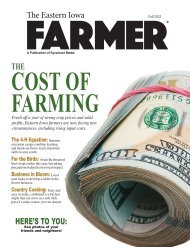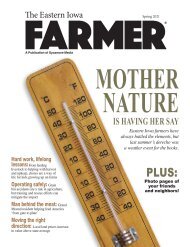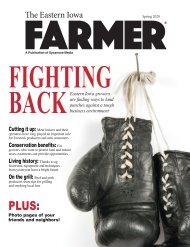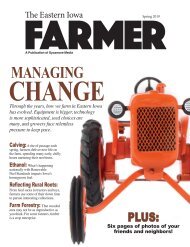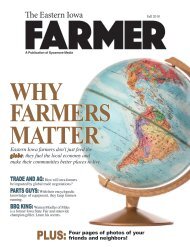Eastern Iowa Farmer Fall 2020
You also want an ePaper? Increase the reach of your titles
YUMPU automatically turns print PDFs into web optimized ePapers that Google loves.
coronavirus<br />
“We did things we never thought we’d do,”<br />
he said. That includes sending pigs to Colorado<br />
and Wisconsin, and turning some animals<br />
loose outside to free up barn space. To safely<br />
slow down the growth of the hogs almost ready<br />
for market, he adjusted diets and bumped up<br />
the temperature in the finishing barn from 62<br />
degrees to 70 degrees – animals, like humans,<br />
tend to eat less when they are warmer.<br />
“Those are the kinds of things we didn’t<br />
have to do before – and they worked. We were<br />
able to hold it together and get pigs to market,”<br />
he said, adding that one unique opportunity<br />
that came out the pandemic was selling pigs<br />
directly to consumers who wanted to put meat<br />
in their freezers.<br />
For McCulloh and other producers who raise<br />
the hogs that secure <strong>Iowa</strong>’s spot as the nation’s<br />
top pork producer, the pandemic has been a<br />
white-knuckled ride maneuvering the logistical<br />
nightmares caused by packing plant closures<br />
and slowdowns.<br />
“It’s been a roller coaster,” he said.<br />
The damage to <strong>Iowa</strong>’s hog industry this year<br />
is estimated at $2.1 billion, according to an impact<br />
analysis by <strong>Iowa</strong> State University’s Center<br />
for Agricultural and Rural Development. The<br />
<strong>Iowa</strong> Pork Producers Association said farmers<br />
were losing an average of $37 per hog. That’s<br />
on top of the negative impacts of trade wars for<br />
the past two years,<br />
At the end of May, <strong>Iowa</strong>’s meatpacking<br />
plants were operating at only 80 percent of<br />
capacity and livestock producers were facing<br />
the difficult prospect of euthanizing animals,<br />
<strong>Iowa</strong> Secretary of Agriculture Mike Naig said<br />
on May 29 when he announced $24 million in<br />
aid for <strong>Iowa</strong> livestock producers who had to<br />
dispose of animals.<br />
One sign of hope is that by early July<br />
packing plants nationally were at about 95%<br />
of operational capacity, said Lee Schulz, an<br />
economist and associate professor at <strong>Iowa</strong> State<br />
University.<br />
“<strong>Iowa</strong> is running near that national average.<br />
When we look at parts of April and May, we<br />
were running below that national average,” he<br />
said.<br />
“A big part in getting back up to capacity<br />
this summer has been Saturday slaughter,”<br />
Schulz said. Pre-pandemic, the packing industry<br />
typically registered a 5.4-day work week,<br />
“Everything is<br />
driven for efficiency<br />
because every week<br />
you move hogs to<br />
market. There’s a<br />
trickle-down effect<br />
across the board.”<br />
— Chris Mcculloh<br />
You know what they say when<br />
you assume something...<br />
at Rolling Hills Veterinary service,<br />
we’ll leave you with no doubts.<br />
Animals are our business. We will care for yours as if they were our own.<br />
Specializing in Beef and Dairy Herd Health, Consultation and Surgery<br />
thank You<br />
For Your<br />
Business!<br />
dr. tom Lapke, dr. Chris Rock, dr. Luke thole, dr. Joe Jedlicka<br />
Rolling Hills<br />
VeteRinaRy seRVice<br />
CasCade:<br />
1103 1st ave e.<br />
563-852-3237<br />
LaMotte:<br />
113 s. Main st.<br />
563-773-2771<br />
eifarmer.com fall <strong>2020</strong> | <strong>Eastern</strong> <strong>Iowa</strong> <strong>Farmer</strong> 65








